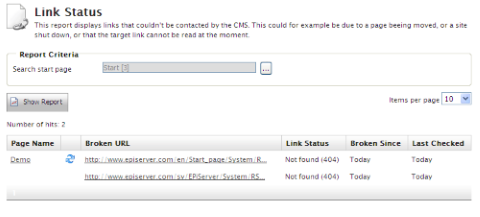Five New Optimizely Certifications are Here! Validate your expertise and advance your career with our latest certification exams. Click here to find out more
- Caching
- Client Resources
- CMO
- Installing and Configuring the Aggregation Service
- Integrating EPiServer CMO with External Applications
- Configuring Live Monitor for Multiple Bindings
- Configuring the Statistics Handler
- Configuration
- How To
- Configuration Syntax
- Configuring episerver Section
- Configuring episerver.basicAuthentication Section
- Configuring episerver.dataStore Section
- Configuring Image Service
- Configuring Live Monitor
- Configuring Quick Publishing
- Configuring Which User Interface to Use
- Content
- Pages and Blocks
- How To
- Adding Edit Hints When Not Using the Property Web Control
- Changing Display Channel Programmatically
- Converting Page Types for Pages
- Creating a Page Programmatically
- Creating Page Templates and Block Controls
- Edit hints in MVC
- Selecting a Template Based on Tag
- Working with Page Objects
- Attributes
- Blocks, Block Types and Block Templates
- Pages, Page Types and Page Templates
- Refactoring Content Type Classes
- Synchronization
- Properties
- Display Channels
- Links
- Persisting IContent Instances
- Shared Blocks and Folders
- Working with IContentRepository/DataFactory
- Content Providers
- Deployment
- Configuring a Multi-Site Setup
- Configuring XML Update Reference
- Deployment Center
- Enterprise Features
- Dynamic Content
- Editing
- Event Management
- File System
- Globalization
- Initialization
- Localization
- Logging
- Mirroring
- Navigation and Listings
- Personalization
- Routing
- Scheduled Jobs
- Search
- Search Integration
- Searching for Pages Based on Page Type Property
- Searching for Pages Based on Page Type
- Security
- Authentication and Authorization
- Configuring Active Directory Membership Provider
- Handling Cookies on the Website
- Protecting Users From Session Hijacking
- Securing Edit and Admin
- Virtual Roles
- Configuring Web Services Authentication
- Subscription
- Validation
- WebDAV
- Workflows
- XForms
Configuring Link Validation
Introduction
In EPiServer CMS it is possible to track broken links for a website using the link validator scheduled job. In the following you will find out how this works and how to the scheduled job can be configured.
The Link Validator scheduled job will go through all the links in tblContentSoftLink, do a head request against each one, and save the links status back to tblContentSoftLink.
The result of the validation job is available as a report called Link Status report in Report Center.

The scheduled job will first get a batch of links from tblContentSoftLink, a maximum of 1000. Only links that are unchecked or checked earlier than the time when the job started will be returned. The job uses the date the link was last checked and the re-check interval to determine if it's time for the link to be checked again.
Each of the links in the batch will be checked using a head request, if the servers robots.txt allows for this. No host will be checked more than once every five seconds. If a link exists on a host that has been checked in the last five seconds the job will wait until five seconds has passed and then check the link.
The status of the link, including HTTP status code if possible, will be saved back to tblContentSoftLink. The date the link was checked will also be saved. For broken links, information about when they were first found broken, will be saved. When the first batch of links has been checked, a new batch will be fetched from the database.
The job will continue until it is not possible to get any more unchecked links form the database, or the jobs runtime has exceeded the value set in maximumRunTime. The job will also stop if a large number of consecutive errors are found on external links, in case of some general network problem with the server running the site.
Configuring the Link Validator
None of the settings are required but are avalible for customization of the behavior of the link validation job. The <linkValidator> node should be added as a child to the <episerver> node of the web.config file. Example:
<linkValidator
externalLinkErrorThreshold="10"
maximumRunTime="4:00:00"
recheckInterval="30.00:00:00"
userAgent="EPiServer LinkValidator"
proxyAddress="http://myproxy.mysite.com"
proxyUser="myUserName"
proxyPassword="secretPassword"
proxyDomain=".mysite.com"
internalLinkValidation="Api">
<excludePatterns>
<add regex=".*doc"/>
<add regex=".*pdf"/>
</excludePatterns>
</linkValidator>To configure the behavior of the link validation job, you have the following options:
- externalLinkErrorThreshold. If there are more than the configured value of consecutive errors on external link the job will abort.
- maximumRunTime. The maximum time the scheduled job will execute.
- recheckInterval. A link that has been validated as working will not be rechecked until the configured time span has elapsed.
- userAgent. The user agent string to use when validating a link.
- proxyAddress. Web proxy address for the link checker to use when validating links.
- proxyUser. Web proxy user for authenticating proxy connection.
- proxyPassword. Web proxy password to authenticate the proxy connection.
- proxyDomain. Web proxy domain to authenticate the proxy connection.
- internalLinkValidation.
How the link validator should handle internal links. Possible values:
- Off. Internal links will be ignored.
- Api. The internal API will be used to validate that the referenced page exists. [default].
- Request. Internal links will be the same way as external, using a head request.
- excludePatterns. A list of patterns for links that the link validation job will skip. Use the regex attribute to identify what links to skip.
Known Limitations
The link validator does not handle private resources with the exception of pages. This includes documents and images stored on a local VPP that does not allow anonymous access. If forms authentication is used, these links will never be validated and are never shown in the link report. If basic or Windows authentication is used, links to these resources will result in 401 (access denied) in the link report. This may be the case for an intranet site with Windows authentication and anonymous access disabled.
Last updated: Mar 25, 2013
